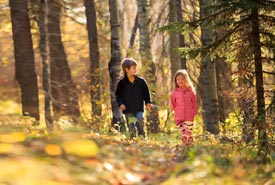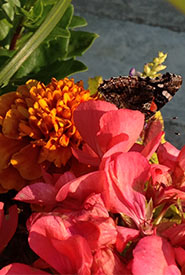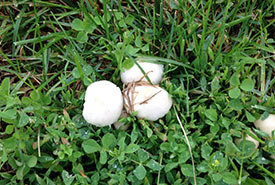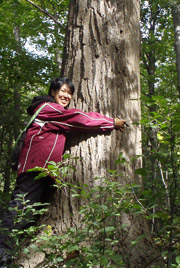The biggest nature lesson I learned from kids

Children walking in the woods, Bunchberry Meadows Conservation Area, AB (Photo by Kyle Marquardt)
Years ago I worked at an overnight summer camp as its nature director. My main role was to teach and help campers discover the beauty of Mother Nature. I was given very few guidelines, other than it was highly recommended that I take the campers into the forested area behind the pond.
I tried to take the campers into the forest, but found that it was hard for them to listen or care about the lesson I was trying to teach. We spent more time swatting the mosquitoes and being attacked by nature than appreciating and learning about nature. In the end I had campers who began despising stepping foot outside and would rather enjoy their time at camp inside where they were safe from nature’s attacks.

Watching a butterfly land and pollinate a flower drew more attention. (Photo by Jillaine Yee)
I was halfway through summer and I felt I was fighting a losing battle. I felt like I had failed the campers, the camp director and all the nature directors before me. No one liked my lessons; they never talked about them during breaks. I felt like the one staff member that the campers tried to avoid.
I had nothing to lose. I tossed all my previous lesson plans, threw out the camp director’s recommendation to take the campers into the forest and delved into Joseph Cornell’s book, Sharing Nature with Children. In my next lesson I took the campers to an open field with a picnic bench, a handful of trees and no bugs. I handed out magnifying glasses to each camper and gave them one instruction: go and discover something "cool" about nature. I didn’t really have a plan; I just knew that the kids didn’t like the bugs and I really wanted to trust Cornell.

Mushrooms growing did not garner as much attention. (Photo by Jillaine Yee)
As you could imagine, the campers did the first thing all kids do with magnifying glasses: they tried to burn things or light things on fire. Eventually they started getting excited and noticing the small things: following a line of ants to their hill, or watching a bee pollinate a flower, until one camper found a small bird’s nest in a young tree.
The tree was just big enough that the campers had to stand on tip toe to look into the nest and count the four light blue eggs. This group of campers took it upon themselves to educate the rest of the campers about the bird’s nest, to make sure no one touched them or bothered them.
Connecting with nature is more than going into the wild
This group of campers and their little nest of eggs made me realize that you don’t need to go out into the “wild” in order to appreciate and benefit from nature. I finally felt that I accomplished my one mission at camp. I gave the campers the tools and they connected with nature in the most meaningful way; they became stewards of nature. They moved from simply appreciating the flowers and birds, to sharing what they learned with others and then to protecting it from harm.
Nature is all around us, from the organisms in the dirt, the flowers in our garden, to the sunset we experience every evening. Sometimes we just need a nudge in the right direction to see it and begin appreciating it.


